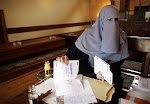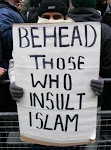The mainstream media has publicized a few cases of Somali-American youth that have returned to their homeland to fight for Islamist forces there. What the media has neglected to investigate is how Islamist members of the Somali-American community have formed organizations to advocate their agenda here in the United States. These organizations, which claim to represent the larger Somali community, silence moderate Muslim voices and impede the integration of Somalis into American society.
There are approximately 200,000 Somalis living in the United States, the largest community of 70,000 people residing in Minneapolis-St. Paul (population statistics for Somalis in America are rough estimates because many Somalis are here as refugees and therefore are not counted in official surveys). According to Andrew Liepman, the deputy director of intelligence at the National Counterterrorism Center, Somali-Americans face “greater insularity compared to other, more integrated Muslim immigrant communities, [which] has aggravated the challenge of assimilation for their children.”
Islamists have taken advantage of this insularity to disseminate their ideology within the community. The Islamists’ dogma ascribes no value to American cultural norms and has therefore led to clashes between Somalis and their host communities.
In one such incident, Hassan Mohamud, a prominent Somali-American imam, recently encouraged his congregants to give to Islamist causes in order to ameliorate “the hell of living in America.” Under the leadership of Mohamud and three other imams, Somali cab drivers in 2007 boycotted patrons carrying alcohol or accompanied by dogs — including those required for the visually impaired — because they claimed driving such passengers violates Sharia law.
In another Islamist-inspired incident, radical Somalis organized a labor strike in September 2008 at a meat packing plant in Grand Island, Nebraska. The factory workers at the plant were expected to work during the time allocated for the prayer that marks the end of the daily fast during the month of Ramadan. The Islamists’ agenda was to force the factory to adopt a different work schedule that would necessitate non-Muslim workers to come to their jobs on Saturdays for the entire month in order to receive their 40 hours of pay.
Fidencio Sandoval was one of over a thousand workers at the plant who counter-protested against the Islamists. “A new culture comes in with their demands and says, ‘This is what we want,’” he notes, contrasting the Islamists’ demand for concessions with the expectation of assimilation applied to other immigrant groups in America.
The Islamist Somalis also asserted their influence at the Hennepin County Medical Center in Minneapolis. The center was forced to hire an almost entirely female obstetrical staff in order to placate Islamists who refused to have male doctors deliver their babies.
The Somali Islamist Sharia campaign has even reached the Bible Belt. The small town of Shelbyville, Tennessee, was besieged by Islamist Somalis who, according to local journalist Brian Mosely, refuse to deal with women in stores, demanding to see a male salesperson.
Somali Islamists have marketed their organizations to parents, emphasizing that their programs are a means to escape from the rough neighborhoods where many Somali immigrants find themselves. According to Liepman, “Parents and outsiders often view [these radical Islamist organizations] as a seemingly innocuous alternative to more common violent subcultures associated with gangs and criminality.”
A number of prominent Somali-American leaders have condemned the radical Islamists who claim to represent their community. These leaders seek to facilitate the integration of Somalis into American society. One such leader is Hussein Samatar, director of the Minneapolis-based African Development Center.
“The mosques and community must be open and transparent,” argues Samatar. “Our faith must be uplifting, unifying, inspiring, and hopeful.”
Unlike Mohamud and other Islamist Somalis, Samatar praises the opportunities available to Somalis in America. “Americans of Somali descent should be ambassadors of America throughout the Islamic world,” he says. “They should show Muslim countries what is inherently great about America and the American people.”
Samatar rejects the Islamists’ attempts to impose Sharia law on his community, lauding the freedom of religion provided in the States. “America is the best country in which to be a practicing Muslim,” he says. Recalling the civil war in Somalia, he notes, “We are well aware of the beauty of having the choice to practice one’s faith without being fearful or oppressed.”
Liepman and Samatar recognize what the mainstream media has ignored: the main challenge for the Somali-American community is not a few isolated incidents of youth joining Islamist forces thousands of miles away, but the calculated effort of Islamists in their midst to hinder their integration into American society.
“The overwhelming majority of Somali-Americans are or want to be contributing members of American society,” Liepman says.
These voices must be empowered and the Islamists marginalized so that Somali-Americans can take part in the same opportunities afforded to all citizens of their adopted homeland.
The overwheling majority of somalis are or want to be contributing members of American society? Sure. The vast majority of muslims want to have sharia law as the law of the world. We need to stop trying to placate these animals.
12 years ago






















No comments:
Post a Comment